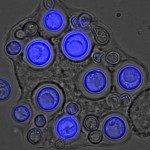Lien vers Pubmed [PMID] – 10569743
Infect. Immun. 1999 Dec;67(12):6314-20
Cryptococcosis is an hematogenously disseminated meningoencephalitis during which the relationship between the disease severity and the immune response remains unclear. We thus analyzed, by enzyme-linked immunosorbent assay, proinflammatory (tumor necrosis factor alpha [TNF-alpha] and interleukin-6 [IL-6]) and anti-inflammatory (IL-10) cytokine levels in plasma at the time of diagnosis in 51 AIDS patients with culture-proven cryptococcosis. We used a murine model to determine the correlation between cytokine levels and fungal burden in blood and tissues and the kinetics of the immune response and of the formation of cerebral lesions. In AIDS patients, plasma TNF-alpha and IL-10, but not IL-6, levels were significantly higher in the case of fungemia or disseminated infection than in their absence, whereas the presence of meningitis had no influence on these levels. In mice, none of these cytokines were detected within the first day after inoculation. Later on, TNF-alpha and IL-10, but not IL-6, levels in plasma correlated significantly with the fungal burden in the blood and spleen but not the brain. In the brain, cytokine levels were low compared to those in other compartments, and tissue lesions and a degree of infection similar to those observed in humans were seen, further suggesting the relevance of this experimental model. Thus, AIDS patients with cryptococcosis produce an immune response that reflects the dissemination but not the meningeal involvement. This murine model of disseminated cryptococcosis can be used to investigate the pathophysiology of cryptococcosis and new therapeutic approaches.

